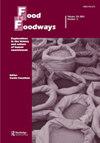计算殖民地早期澳大利亚的食糖里程
IF 1.1
Q2 ANTHROPOLOGY
引用次数: 2
摘要
摘要食物里程是20世纪90年代发展起来的一个概念,是对长途运输食物带来的负面社会和环境后果的批判。虽然旨在引起人们对当代问题的关注,但食物流动有着悠久的历史,食物里程的概念可以有效地应用于此。本文利用政府信件、统计数据和个人期刊,调查了1788年至1800年间食物里程在澳大利亚新南威尔士殖民地建立过程中的意义,特别强调了糖。虽然存在20世纪末注意到的一些问题,但其他因素,如高昂的运输成本、相关废物和粮食安全,对殖民地的供应者来说更为关切,并导致他们寻求通过在该地区购买物资来减少粮食里程。然而,其他优先事项,包括对熟悉食物的偏好和将贸易限制在大英帝国内部,造成了反补贴压力,在整个审议期间,食品里程一直很高。这项研究表明,早在这个术语被创造出来之前,食物里程就在围绕食物供应的决策中发挥了作用,并将这一概念应用于其他历史时期。本文章由计算机程序翻译,如有差异,请以英文原文为准。
Counting the food miles of sugar in early colonial Australia
Abstract Food miles is a concept developed in the 1990s as a critique of the negative social and environmental consequences of transporting foods over very long distances. While intended to draw attention to a contemporary problem, the movement of food has a long history to which the concept of food miles can be usefully applied. Drawing upon government correspondence, statistics and personal journals, this article investigates the significance of food miles in establishing the colony of New South Wales, Australia, between 1788 and 1800, with a particular emphasis on sugar. While the some of the issues noted at the end of the twentieth century were present, other factors, such as the high costs of transport, associated waste, and food security were of greater concern to those provisioning the colony and led them to seek to reduce food miles by purchasing supplies in the region. However, other priorities, including preferences for familiar foods and for restricting trade to within the British Empire, created a countervailing pressure which kept food miles very high throughout the period under consideration. This study shows that long before the terminology was coined, food miles played a role in decision making around food supplies and invites the application of the concept to other historical periods.
求助全文
通过发布文献求助,成功后即可免费获取论文全文。
去求助
来源期刊

Food and Foodways
ANTHROPOLOGY-
CiteScore
2.20
自引率
0.00%
发文量
16
期刊介绍:
Food and Foodways is a refereed, interdisciplinary, and international journal devoted to publishing original scholarly articles on the history and culture of human nourishment. By reflecting on the role food plays in human relations, this unique journal explores the powerful but often subtle ways in which food has shaped, and shapes, our lives socially, economically, politically, mentally, nutritionally, and morally. Because food is a pervasive social phenomenon, it cannot be approached by any one discipline. We encourage articles that engage dialogue, debate, and exchange across disciplines.
 求助内容:
求助内容: 应助结果提醒方式:
应助结果提醒方式:


